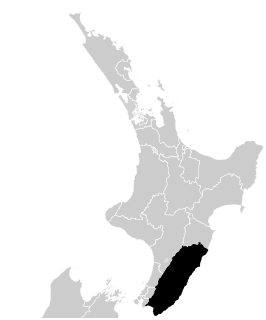Related Research Articles

Dunedin North is a former New Zealand parliamentary electorate, which returned one Member of Parliament (MP) to the New Zealand House of Representatives. It was established for the 1905 election and has existed since. It was last held by David Clark of the New Zealand Labour Party, who replaced the long-standing representative Pete Hodgson. It was considered a safe Labour seat, with Labour holding the seat for all but one term (1975–1978) since 1928. In the 2020 electoral boundary review, Otago Peninsula was added to the area to address a population quota shortfall; with this change the electorate was succeeded by the Dunedin electorate in the 2020 election.

Dunedin South is a former New Zealand parliamentary electorate. It first existed from 1881 to 1890, and subsequently from 1905 to 1946. In 1996, the electorate was re-established for the introduction of MMP, before being abolished in 2020.
Otago was a New Zealand parliamentary electorate first created for the 1978 election, which was replaced by the Waitaki electorate and Clutha-Southland electorates for the 2008 election. Its last representative was Jacqui Dean of the National Party.

Wairarapa is a New Zealand parliamentary electorate. It was first created in 1858 and existed until 1881. It was recreated in 1887 and has since existed continuously. In the early years, the electorate was for a time represented by two members. Wairarapa has been held by Kieran McAnulty since the 2020 election.

James Wright Munro was a New Zealand politician of the Labour Party.

Waitaki is an electorate for the New Zealand House of Representatives that crosses the boundary of North Otago and South Canterbury towns on the East Coast of the South Island. The electorate was first established for the 1871 election that determined the 5th New Zealand Parliament. It has been abolished and re-established several times and in its early years was a two-member electorate for two parliamentary terms. The current electorate has existed since the 2008 election and is held by Jacqui Dean of the National Party.
Clutha was a New Zealand parliamentary electorate from 1866 to 1996.
Dunedin West was a New Zealand parliamentary electorate, in the city of Dunedin. It existed for three periods between 1881 and 1996 and was represented by seven Members of Parliament.
Timaru was a parliamentary electorate, in New Zealand's South Island. It existed continuously from 1861 to 1996 and was represented by eleven Members of Parliament.
Peninsula was an Otago electorate in the New Zealand Parliament from 1881 to 1893, based on the Otago Peninsula.
Inangahua is a former parliamentary electorate in the Buller District, which is part of the West Coast region of New Zealand, from 1881 to 1896. The town of Inangahua Junction, which gave the electorate its name, was located in the adjacent Buller electorate until 1887.
Chalmers, originally Port Chalmers, was a parliamentary electorate in the Otago Region of New Zealand, from 1866 to 1938 with a break from 1896 to 1902. It was named after the town of Port Chalmers, the main port of Dunedin and Otago.
Caversham was a parliamentary electorate in the city of Dunedin in the Otago region of New Zealand, from 1866 to 1908.
Mornington is a former parliamentary electorate from 1946 to 1963, centred on the suburb of Mornington in the city of Dunedin, New Zealand.
Taieri is a parliamentary electorate in the Otago region of New Zealand, initially from 1866 to 1911, and was later recreated during the 2019/20 electoral redistribution ahead of the 2020 election.
Marsden was a former parliamentary electorate, in the Whangarei District and in the Northland Region of New Zealand, which existed from 1858 to 1972. Upon its abolition, Marsden was replaced with the Whangarei electorate.
Mataura was a parliamentary electorate in the Southland Region of New Zealand, from 1866 to 1946.
City of Dunedin, during the first two parliaments called Town of Dunedin, was a parliamentary electorate in Dunedin in Otago, New Zealand. It was one of the original electorates created in 1853 and existed, with two breaks, until 1905. The first break, from 1862 to 1866, was caused by an influx of people through the Otago Gold Rush, when many new electorates were formed in Otago. The second break occurred from 1881 to 1890. It was the only New Zealand electorate that was created as a single-member, two-member and three member electorate.
Dunedin East was a parliamentary electorate in the city of Dunedin in the Otago region of New Zealand from 1881 to 1890.
Dunedin Suburbs is a former parliamentary electorate in the city of Dunedin in Otago, New Zealand from 1890 to 1893. The electorate was represented by one Member of Parliament, William Dawson, representing the Liberal Party.
References
- McRobie, Alan (1989). Electoral Atlas of New Zealand. Wellington: GP Books. ISBN 0-477-01384-8.
- Wilson, James Oakley (1985) [First published in 1913]. New Zealand Parliamentary Record, 1840–1984 (4th ed.). Wellington: V.R. Ward, Govt. Printer. OCLC 154283103.
- Norton, Clifford (1988). New Zealand Parliamentary Election Results 1946–1987: Occasional Publications No 1, Department of Political Science. Wellington: Victoria University of Wellington. ISBN 0-475-11200-8.